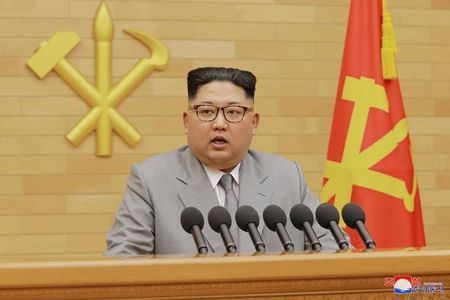North Korea agrees to talk to South after U.S.-S.Korea postpone drills

SEOUL/WASHINGTON (Reuters) - North Korea agreed on Friday to hold official talks with South Korea next week, the first in more than two years, hours after Washington and Seoul delayed a military exercise amid a standoff over Pyongyang's nuclear and missile programmes.
U.S. Secretary of State Rex Tillerson told U.S. media it was too early to tell if the inter-Korea meeting could open the way for future talks involving the United States, but he stressed that if such talks came about they would have to be aimed at North Korean denuclearization.
South Korea said North Korea had sent its consent for the talks to be held next Tuesday at the border truce village of Panmunjom. The last time the two Koreas engaged in official talks was in December 2015.
The two sides are expected to discuss the Winter Olympics, to be held in South Korea next month, and inter-Korean relations, South Korean Unification Ministry spokesman Baik Tae-hyun told reporters.
North Korea asked for further negotiations about the meeting to be carried out via documented exchanges, Baik said.
North Korean leader Kim Jong Un opened the way for talks with South Korea in a New Year's Day speech in which he called for reduced tensions and flagged the North's possible participation in the Winter Olympics.
But Kim remained steadfast on the issue of nuclear weapons, saying the North would mass-produce nuclear missiles for operational deployment and warned he would launch a nuclear strike if his country was threatened.
U.S. President Donald Trump on Thursday called the proposed inter-Korean talks a "good thing," and he and his South Korean counterpart Moon Jae-in announced that annual large-scale military drills would now take place after the Olympics.
The North sees the drills as preparations for invasion and justification for its weapons programmes that it conducts in defiance of U.N. Security Council resolutions. South Korea and the United States are technically still at war with North Korea after the 1950-53 Korean conflict ended with a truce, not a peace treaty.
Trump, who hurled fresh insults at the North Korean leader this week, took credit for any dialogue that takes place.
"Does anybody really believe that talks and dialogue would be going on between North and South Korea right now if I wasn't firm, strong and willing to commit our total 'might' against the North," Trump tweeted.
TILLERSON WARNING
Speaking to CNN, Tillerson made clear that Washington was also open to talks with North Korea, but warned that while it aimed to resolve the crisis diplomatically, "those diplomatic efforts are backed by a strong military option if necessary."
Tillerson said future talks involving the United States could allow North Korea to "chart a way for themselves to a more secure future, a more prosperous future." He added: "They do know how to reach us if and when they are ready to engage with us as well."
Tillerson said how such talks might begin had yet to be determined, but North Korea would have to signal it understood that they would be aimed at "final, full denuclearization."
He told the Associated Press it remained to be seen whether the North Koreans would want to talk about more than the Olympics next week.
The meeting could be a “vehicle through which they would like to tell us that they would like to have some discussions,” the AP quoted Tillerson as saying.
“It could be meaningful, it could be important. It could be a meeting about the Olympics and nothing else happens.”
North Korea says its weapons are necessary to counter U.S. aggression, and it regularly threatens to destroy the United States and its two key Asia allies, Japan and South Korea.
Chinese Foreign Ministry spokesman Geng Shuang welcomed North and South Korea "taking positive steps to improve ties," and said the postponement of the exercises was "without doubt a good thing."
China's Commerce Ministry said it would limit exports of crude oil, refined oil products, steel and other metals to North Korea, in line with tough new sanctions imposed by the United Nations.
Japanese Defence Minister Itsunori Onodera sounded a note of caution about the proposed talks.
"I think what is important is to maintain a firm defence posture," he told reporters. "North Korea goes through phases of apparent dialogue and provocation, but either way, North Korea is continuing its nuclear and missile development. We have no intention of weakening our warning and surveillance."
I do not believe that civilization will be wiped out in a war fought with the atomic bomb. Perhaps two-thirds of the people of the earth will be killed.
- Albert Einstein